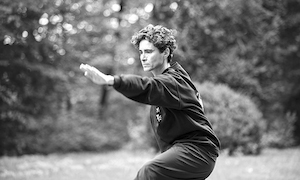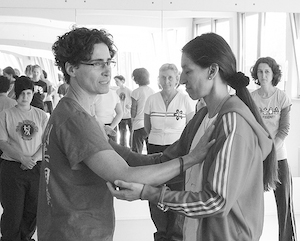Taijiquan for Women’s Self-Defence

Today, more and more women are training in Taijiquan, but for many women the fear of contact concerning “Tuishou” – the pushing hands – remains. In his book: “There are no Secrets”, Wolfe Lowenthal attempts to find explanations for this apprehension:
“Professor Zheng Manqing’s opinion was that women are naturally more talented for Taijiquan than men. Most men require years of training before they develop the feeling for sensitivity and softness that women inherently have. Even so, for some women it may take years until their talent pays off. In the mean time, if they are practising Tuishou in a non-sensitive surrounding, they are being pushed around and “instructed” by male teachers.
Most frustrating for women to be taught by physically stronger men, who “win” due to their physical strength is that because the male instructors are physically stronger, they believe that they have more knowledge because they are winning.” (1)
The number of women that participate in Tuishou is one of the indicators of the quality of a Taiji-school, writes Lowenthal. (2)
The Tuishou-training demonstrates more clearly than the training of the forms the fighting aspects of the Taijiquan and it is also the link to self-defense. It introduces the connection to self-defense.
Taijiquan is said to be a highly effective art of self-defense. But is that also true for women? One must ask, is this ancient Chinese art suitable for women’s contemporary living conditions?
Self-defense for Men and Women
Self-defense is defined as the prevention of assaults, either physical or emotional towards one’s self. Self-defense means to have confidence in one’s self, to trust the inner strength and power. It does not mean to fight against somebody but instead to stand up for (defend) one’s self. Within this understanding of self-defense, self-assertion is where no physical contact takes place. In fact, self-assertion includes border violations of all kinds, and more specifically strategies against these violations. In the context of this article, the term “self-defense” implies “self–assertiveness”. A pre-condition for self-defense is to possess or create an awareness of one self. This also means, to face one’s fears and their subsequent limitations – and to deliberately decide not to accept these limitations any longer. Then, it is possible to act spontaneously, defending against a violation of one’s boundaries. It is not always easy to face the their own fears and recognize their limitations, in addition to consciousness it takes courage.
In his book “Pushing Hands”, Jan Silberstoff writes “I reiterate that women’s self-defense is governed by completely different rules than men’s.”(3)

Self-defense for women must be viewed in a societal context. Therefore, it is necessary to understand the structural aspect of violence against women. Different forms of violence serve to intimidate and keep women in a constant state of fear. Violence against women occurs in all social classes, ranging from discriminatory social structures and practices to direct physical assaults. The aggressors are primarily male and are often family, colleagues or friends.
Authors such as Susan Brownmiller believe rape is used as an instrument of power primarily by men against women (4). Although there is now a greater public awareness regarding this issue, the fact remains that this crime against women is still prevalent in society. The fear of rape is still a reality for every woman, even in the 21st century. In order to educate women about the benefits of Taijiquan with regard to self-defense, this reality and its impact must be considered in the training.
“In order to stand up for, or to help somebody else, a woman must be stable and secure, to be in her own inner balance. Only then can she act effectively for others.”
Violence, especially in its sexual form, severely restricts the autonomy of girls and women thereby hindering full development and expression of their personality. Daily humiliation adversely influences the self-confidence of girls, while being subject to physical violence can lead a young girl/woman so far as to reject her own body. Research from different organizations that work with victims of sexual abuse confirm these effects. Affected women and girls often suffer from feelings of helplessness and lose faith in their own abilities, causing additional physical and emotional limitations, which sometimes occur unconsciously.
Women and Tuishou
There are women in Taiji, that despite many years of training, who still view Tuishou skeptically. Taijiquan means softness, compliance, “invest in loss” (Zheng Manqing), characteristics many women inherently possess due to their socialization. However, because of this socialization, it is exactly the opposite characteristics that many have not had the ability to learn: characteristics such as taking one’s own space, standing up for one’s self, fighting for one’s own defense, and not only for others.
Through the practice of standing meditation, I learn to take my own space, the space in myself. This is the basic requirement to be able to take our own space in the world. In the Tuishou-training (the pushing hands), the focus lies exclusively on flexibility and softness and thus utilising the female socialisation instead of counterbalancing it. For many women it would make sense to first invest training time in winning, learning to stand one’s ground and take one’s space, instead of building on something they already can. However, only when one is able to take her own space, is there a choice to be made as to whether to stand her ground or leave. In traditional Taiji training there is a risk for women to take the second step before the first step, essentially eliminating her choice.
In order to stand up for, or to help somebody else a woman must be stable and secure, to be in her own inner balance. Only then can she act effectively for others. Women sometimes say that they have no interest in being pushed around during their training time in addition to what they experience during their daily lives. This is frequently because they haven’t had any positive experiences with Push-Hands yet. However, it is exactly the Push-Hands training that offers many possibilities, such as to get to know oneself better, developing and testing one’s own abilities and growing somewhat playfully as an approach to the martial aspect of the Taiji.
Recently at a Taiji seminar, I repeatedly heard from a colleague “for a woman you push pretty good”. That statement is sadly revealing, even in Taijiquan, men often believe themselves to be the standard against which all else is measured. It is precisely for this reason that women should be also explicitly taught by women. To give women the opportunity to share their experiences with Tuishou, I, together with Almut Schmitz, organized the first Women’s Push-Hands meeting in Germany. The concept was to give women the opportunity to be taught by women, and to provide a space in which women that were skeptical of the Push-Hands could also experience it. This meeting takes place annually, providing possible exchanges among experienced “pushers”, and an opportunity to build networks among women, who have studied in different schools, and wish to develop further experiences in Taijiquan (Tuishou).
Taiji and Self-Defence
Compared to my experiences with Karate, and other martial arts, I quickly realized a valuable consequence of Taiji, as I studied in the WCTAG, with Chen Xiaowang and Jan Silberstorff. The efficiency of martial arts for self-defense purposes has always interested me. So, after my first experience with standing meditation training (Zhanzhuang) in Chen Taijiquan, I kept asking myself: “What is this standing around, when combined with the slow movements of the Taiji, supposed to achieve in a severe, physical combat situation?”
Soon I noticed the first changes, I felt and filled my own inner space. I was calmer, and slowly the feeling of my inner center developed. The training helped me to relax and let go of daily stress. This ability to relax and be calm even when under pressure or extreme stress, gives one the capability to be able to keep a better overview of a situation, which is of existential importance in a self-defense situation.
Through the strengthening of one’s own being, through a restful and realistic realization, through a peaceful and healthier way of being comes the improvement of one’s condition, which in turn increases the determination to stand up for one’s self. The precondition therefore is the creation of one’s own awareness, the self- conscious. Standing meditation creates this conscious condition; it helps one to realize their own space and how to preserve it.
However Taijiquan-Training with respect to self-defense can have its pitfalls. The defined rules of some martial arts are a disadvantage of those systems, for both men and women while the danger exists that during a real physical attack one will respond only within the limitations of their trained art, essentially only as they are trained to do.
Jan Silberstorff states: “The Tuishou, in disregard of its original goals, is often reduced to sheer tussle of skills which have achieved its own dynamics and regulations. The latter often are no longer relevant for real fighting situations.” (5)
A real physical assault is by nature unfair, deceitful and uncontrollable. Anything can happen, there are no rules that control it! This is important to consider – for men and women!
Within Taijiquan-Training, the special situation of women deserves to be considered. In my opinion, self-defense in Taijiquan begins with the previously described positive effects of standing meditation.
Feeling confident and secure with oneself, with a calm, centered and peaceful aura, and having a more sensitive perception, present the best preconditons for self-defence. Often (physical ) confrontations will not even come to pass any more, as a result of this centered and peaceful aura.
This cannot be true in all cases and is no guarantee against future assaults. It should be mentioned that the advantages of Taijiquan to both physical and emotional health remain. Not only does it help to keep one healthy, but it also helps to better understand the interrelationships of the world and of being in the world ( being in this life ) fundamentally.
Taijiquan offers a wonderful opportunity to do something good for one’s self. To become calm, better centered thus finding more stability, thereby making the daily struggles easier to navigate. Training in Taiji leads to a relaxed, peaceful and subsequently happier life, also providing the conditions for a spiritual way of life.
Teaching Taiji for women
Based on my belief that Chen Taijiquan can be an effective means for self-defense, I have been offering Taiji classes for women for years. Self-defense is a central theme in my training concept for women.
To me the concept of self-defense means to rediscover with passion one’s own power, the value of one’s self, to take one’s self seriously. Giving information and explaining belong as much to the training as the joy of discovering and experiencing one’s own physical strength.
My early experiences with feminist self-defense (Wen-Do) (6) taught me exactly as Taiji training teaches, that it is not the learned technique that is fundamental for a successful defense, but much more so, the attitude and the determination. Within this understanding of self-defense each decision is acceptable, even a no-reaction can be a decision.
In order for Taijiquan to work for women as self-defense, issues such as fear, rage, personal inhibitions, and behavioral roles must be addressed. The experiences learned from physical self-defense can be transferred into one’s daily life, where no physical fights take place, thereby creating a consciousness of its own structures and conditioning.
Taiji training should consider not only the specific personal boundary or physically violent situation(s) but equally so the different socialization of women. Without acknowledgment of this different socialization, and its inclusion into the self-defense training, each martial art risks being useless for women as a whole. When considering the different socialization of women, Taiji can be an efficient self-defense. The Tuishou (Push-Hands) when trained with the proper intention can prepare one for real physical conflict without the high risk of injuries.
The Tuishou serves as a bridge to self-defense, pushing is a wonderful means to realize the principles of Taiji in pairs, to experiment and control how the transfer works out. Exercises when standing fixed (Dingbu) can be used the same as exercises with movements (Houbu), to control one’s own stance and to improve it thereby strengthening the inner determination. Furthermore, it can show how the principles of the Taiji apply especially with regard to women’s self-defense. Chen Taijiquan is a means for women to joyously experience the martial art side of Taijiquan. This art can help one to develop her inner determination to stand up and to take responsibility for herself, to care for and to treat oneself well: learning and respecting her own limits, as well as the limits of others.
Regular training in Taiji can provide improved wellbeing and health; increased self-confidence and consciousness thus building the foundation for much more: contentment and happiness, spiritual growth (through a martial art) and additionally the possibility for an effective self-defense.

So, to answer the question asked at the beginning, yes, Taijiquan is an effective self-defense for women – when women’s experiences are specifically considered.
Author: Sasa Krauter
Images: Krauter and Robinson
References
(1) Wolfe Lowenthal Es gibt keine Geheimnisse. Norderstedt: Kolibri- Verl., 1993, S. 49.
(2) ebd.
(3) Jan Silberstorff, Schiebende Hände, Velbert : Lotus-Press, 2008, S.258.
(4) Susan Brownmiller, Gegen unseren Willen. Vergewaltigung und Männergesellschaft, Frankfurt: S. Fischer 1978.
(5) Jan Silberstorff, Schiebende Hände, Velbert: Lotus-Press, 2008, S.24.
(6) Wen-Do, one of the first feminist self-defense systems, was created in Canada at the beginning of the 70’s, as a response to the fact that women, also martial-artists, often are not able to use the techniques they have trained when they face a real attack. Wen-Do means the way (Do) of women (Wen) or women in movement. It is taught entirely by women, for women and girls.
Sasa_Krauter_Portrait_sw.jpg
Sasa Krauter is based in Kharlsruhe, Germany and is a regular teacher at major European events. – http://www.sasakrauter.de
